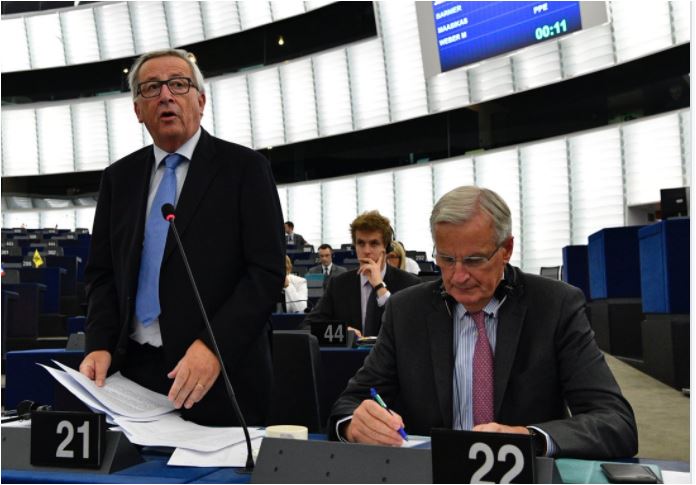Brexit: State of Play of Negotiations with the Uk – 03 October

[vc_row][vc_column][vc_column_text]
Speech by President Juncker at the Plenary Session of the European Parliament in Strasbourg on the state of play of negotiations with the United Kingdom
President
Ladies, Gentlemen
September was a month rich in speeches.
I started with my State of the Union address on the future of Europe in this very House where I laid out the Roadmap for a More United, Stronger and More Democratic Union.
This debate on building a more united, stronger and more democratic Europe continued at the Sorbonne in Paris. President Macron gave a very bold and a very European speech that I would like to congratulate and thank him for once again.
Prime Minister May’s speech, on the other hand, was about separation. In Florence, she struck an optimistic tone on the future relationship between the United Kingdom and the Union.
When it comes to Brexit, we still cannot talk about the future with any real clarity. This is because a condition of Article 50 and the mandate given to us by the leaders of the EU27 are very clear: we first need to agree on the terms of the divorce and then we see if we can half-lovingly find each other again.
The Prime Minister’s speech in Florence was conciliatory. But speeches are not negotiating positions. And as Michel Barnier, the Commission’s excellent Chief Negotiator, said last week: work still remains to be done.
We have not yet made the sufficient progress needed.
The negotiators made good progress on citizens’ rights but the indispensable role of the European Court of Justice in guaranteeing those rights still needs to be agreed.
I am pleased that Prime Minister May and her team recognise that the UK has financial obligations which it must respect. The devil will be, as always, in the detail. But the taxpayers of the EU27 should not pay for the British decision.
And when it comes to Ireland, we can only talk of solutions that fully respect EU law and the Good Friday Agreement.
I will not go into any more detail here as negotiations continue next week and Michel will complete what I was just saying.
For those that think that the UK should just “go over Michel Barnier’s head”, I remind them that the Commission has been appointed by the 27 Member States and my choice of Michel Barnier had been welcomed by them. He acts on their behalf on the basis of clear negotiating mandates.
And he will report to them at the next European Council. Until now I cannot say that we are ready to enter the second phase of the negotiations.
Monsieur le Président,
Avec le départ du Royaume-Uni, une page de l’histoire européenne se tourne.
Et une autre est en train de s’écrire pour décider de l’avenir que nous voulons construire à 27.
Trop longtemps nous avons repoussé des questions cruciales à des lendemains incertains.
Trop longtemps nous avons préféré nous livrer à de longues discussions institutionnelles au lieu de débattre clairement avec les peuples d’Europe de la finalité de notre Union.
Tout cela doit changer. Et tout cela est en train de changer.
Les débats sur le futur de l’Europe se multiplient à travers l’Europe.
C’est bon signe. C’est bon signe parce qu’en le faisant nous démontrons santé et vigueur de la démocratie européenne. C’est ce que nous voulions en tant que Commission en lançant le Livre blanc sur l’avenir de l’Europe, nos différents documents de réflexion et les nombreux Dialogues Citoyens qui se sont multipliés dans tous les coins du continent.
Mais il ne faut pas s’éparpiller. C’est pourquoi j’ai voulu placer la poursuite de ces débats publics dans le contexte d’une feuille de route structurée, avec des échéances précises sur des propositions concrètes.
Cette route nous mènera jusqu’au 30 mars 2019 au Sommet spécial de Sibiu, Hermannstadt, en Roumanie où nous donnerons notre vision d’avenir pour l’Europe et où nous déciderons de ce que nous serons prêts à défendre et à construire ensemble à 27.
Notre avenir ce n’est pas le Brexit, c’est l’Europe.
Mister President,
With the departure of the United Kingdom, a page of European history turns.
And another is being written to decide the future we want to build at 27.
For too long we have pushed crucial questions to uncertain tomorrows.
For too long we have preferred to engage in long institutional discussions instead of discussing clearly with the peoples of Europe the purpose of our Union.
All this must change. And all this is changing.
Debates on the future of Europe are spreading across Europe.
It’s a good sign. This is a good sign because in doing so we are demonstrating the health and vigor of European democracy. This is what we wanted as a Commission by launching the White Paper on the Future of Europe, our various discussion papers and the numerous Citizens’ Dialogues which have multiplied in all corners of the continent.
But we must not scatter. That is why I wanted to place the continuation of these public debates in the context of a structured roadmap with precise deadlines on concrete proposals.
This road will take us until March 30, 2019 at the Sibiu, Hermannstadt Special Summit in Romania, where we will give our vision for the future of Europe and decide what we will be prepared to defend and build together at 27 .
Our future is not Brexit, it is Europe.
SPEECH/17/3662[/vc_column_text][/vc_column][/vc_row][vc_row][vc_column][vc_tta_accordion color=”mulled-wine” active_section=”666″ collapsible_all=”true”][vc_tta_section title=”WHAT MICHEL BARNIER HAD TO SAY” tab_id=”1507031772238-6bed9dde-ba5a”][vc_column_text]
Speech by Michel Barnier at the Plenary Session of the European Parliament on the state of play of negotiations with the United KingdomThank you, Mr. President. And thanks to your Parliament for allowing me to express myself, alongside President Juncker. Members of the European Parliament, Ladies and gentlemen, Dear Matti, I am happy to be here before you today, alongside President Juncker, whom I thank for his personal trust and support. And to be alongside Matti Maasikas whom I congratulate and thank for the quality of the Estonian presidency throughout the week last week. We were here in this chamber for the first time on 5 April 2017, when you adopted your first resolution. You are setting the political direction in this negotiation, just as the European Council has done under President Tusk, by adopting very precise negotiating directives. Six months later, as the clock is still ticking and we are a few days away from the European Council on 19 and 20 October, let us take stock today of the negotiations. Your draft resolution today shows – beyond its concrete subject matter – the full and complete involvement of the European Parliament in this negotiation. I frequently remind people that your Parliament will have the final word. Since day one, we knew that this negotiation would be unique, complex, and would have serious human, social, financial, legal and economic consequences. And these consequences are often underestimated. As the Union’s negotiator, it is for the Commission to negotiate on behalf of the 27 Member States and all the institutions of the Union. Our biggest asset is our unity. This unity does not happen by itself. It does not fall from the sky. It is built, day after day, through the transparency that we have decided to practise with President Juncker, through public debate and through trust. I would like to thank particularly President Tajani, your Brexit coordinator Guy Verhofstadt and the Presidents of the Groups, as well as the members of the Brexit Steering Group, for the quality of our regular exchanges. With your support, we have been working since the beginning of this negotiation to implement the mandate entrusted in us by the Council, and to be fully in line with your resolution and the guidelines adopted by the European Council. This mandate is simple: it consists of us agreeing with the United Kingdom on the principles of its orderly withdrawal as soon as possible, so that we can quickly discuss together the framework of our future relationship. As you know, the three main topics of the orderly withdrawal are citizens’ rights, the financial settlement and Ireland – there are a lot of other topics which cannot be forgotten either, such as Euratom, judicial and administrative procedures, goods placed on the market, and governance. These three topics go together. They are inseparable. You say it yourself in your draft resolution: Prime Minister Theresa May made some openings in her Florence speech ten days ago. The UK negotiation team began last week translating these openings into concrete proposals and clarified a number of issues. In that way, we could advance, particularly on one of our priorities, which is the protection of the rights of citizens. We are also converging on the common principles which will guide our response to the questions on the unique situation of Ireland. Alongside these positive points, there are still serious divergences, in particular on the financial settlement. On this point: we simply expect commitments taken at 28 to be honoured at 28. It is as simple as that: that taxpayers and the 27 Member States do not have to pay for the consequences of a decision they did not make. No more, no less. There are also points of divergence on how to guarantee citizens’ rights. We understand and share the worry of the 4.5 million British and European citizens who want to continue living and working like they did before Brexit. This worry, which you refer to in your resolution, has been worsened by certain discriminatory measures taken by the British authorities. We are worried about this. To effectively guarantee these rights, we need:
Beyond these questions on governance, we are also waiting for guarantees from the United Kingdom on family reunification and the exportation of social benefits acquired in the United Kingdom. On Ireland, both the European Union and the United Kingdom recognise that Ireland is in a unique situation and that any solution must be fully informed by the particular circumstances on the island. As I have said a few times before, these solutions must respect the integrity of the Union’s legal order, as well as the Good Friday Agreement in all its dimensions. At this stage, it is particularly important to ensure the concrete modalities of continuing the numerous North-South cooperation schemes provided for in this agreement and the continuation of the Common Travel Area, which requires precise and detailed work, and which we are engaging in constructively with the British side. As you rightly pointed out in your draft resolution, we have not yet made the “sufficient progress” today to start the second phase of the negotiations with confidence. Firstly, on a possible transitional period, under conditions clearly defined by the European Council. Then on the framework of our future relationship. A fifth round of negotiations will be held next week in Brussels. Our attitude will remain resolutely constructive because we want to succeed. We want to build an ambitious and lasting partnership with the United Kingdom – which will become a third country on 30 March 2019, as was its choice – in trade, but also in security and defence or research and innovation. The sooner we agree on the principles of an orderly withdrawal, the sooner we can concentrate on this objective, which is in our common interest. Ladies and gentlemen, Our approach is based on the fundamental principles of our Union.
These principles have been at the heart of our political project since the beginning. The United Kingdom knows them well, having shared these principles with us for 44 years. They are not negotiable. Once again, as the Chancellor of Germany and President Juncker have said, we know that the future of the Union is more important than Brexit. It is the responsibility of the 27 Member States and the European Parliament to build this future together. To overcome the challenges. A page is turning. This is the United Kingdom’s sovereign choice. We respect it. Now it is up to us for the European Union to write new pages.
SPEECH/17/3665 |
[/vc_column_text][/vc_tta_section][/vc_tta_accordion][/vc_column][/vc_row]




